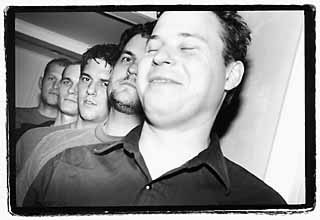Four-Track Rhapsody
By Raoul Hernandez, Fri., March 5, 1999
|
|
With a snap of the fingers, you're fast asleep. A deep sleep. Your eyes are closed, body still, breathing steady, but your mind is wide awake. "Just waking up," sighs the sleepy chorus of voices, rounded guitar tones rising to the surface like air bubbles. The back-alley trumpet call of "Elephant Sound" beckons soon after, "The Bees" buzzing in and out of its bassline next, until "We Aren't the Stars" twinkles unmistakably with a Syd Barrett symmetry out of which rising and falling sound pulses with melodic precision. A woozy Beach Boys wash of "oohs" and "ahhs" sets up the brief, driving "Overplayed," giving way to the chamber sound of "The Charges," but finally, it's the first line of the somnambulant closer "Opus 11:11" that puts words to this aural reverie: "We are very strange. We know your names, we know your numbers."
As one of the final releases on seminal Austin indie label Trance Syndicate, Monroe Mustang's 1998 full-length debut was as enigmatic as its album cover art and title, Plain Sweeping Themes for the Unprepared. At once smooth and polished, the sound is nevertheless warm, intimate. The symbiotic relationship between silence and sound, melody and distortion, lends Plain Sweeping Themes for the Unprepared a seamless cohesion that, like the best recordings, is defined by its own uniquely individual sonic universe into which the listener freefalls. Somebody knew what they were doing in the studio.
"We tried going into the studio once," says Michael Linnen, Monroe Mustang's primary drummer, who, like his four bandmates, also sings, plays guitar, and writes songs. "Once. And we all got so stressed out by it, because it was costing us so much money. The thing about having a four-track [recorder] -- or in this case we bounced our four-track to the Trance eight-track to make the record -- is you don't have to pay, and you can play whenever you want."
Meet the sixth member of Monroe Mustang: the four-track. An integral part of the pop music making process since the early Sixties, four-track home recorders have become a necessity in the fin-de-siecle era of rock & roll, the ultimate DIY empowerment in an age of corporate homogenization. Enabling musicians to record in their bedroom/bathroom/broom closet -- cheaply, and at their own convenience -- four-tracks also facilitate making music when band members live in different cities, or in the same locale with different schedules. Bands like Smog, Guided by Voices, and Palace, musical entities with revolving casts, have defined the use of four-tracks in the Nineties, as well as having had a profound influence on groups such as Monroe Mustang.
Formed in Norman, Okla., from the core trio of next-door neighbors/childhood pals Brian Barry and Jason Stout, and another Monroe Elementary graduate, Taylor Holland (guess what snorting beast the school chose to represent its sports franchises?), Monroe Mustang started kicking to life when Linnen moved to Norman to join a band and fell in with the other three. Other four, if you count the four-track, with which the quartet quickly became intimate. Certainly, there was nothing else to do in Norman.
"That's one of the things about living in Norman," says Linnen, an Air Force brat who, along with his younger brother Chris, grew up in Florida and later Dallas. "There's nothing to do, really. Except there's a lot of bands in Norman -- a lot of good bands -- because you don't have a lot of time to do anything but sit around and make music. You can only play video games for so long. Everybody I knew in Norman played music, and almost every other person had a four-track."
When Barry moved to Rhode Island for graduate school, Holland followed, as did Stout. Linnen moved back to Texas, settling in Austin, where one day he received a tape of "about 100" homemade songs from Barry, Holland, and Stout. In return, Linnen sent his own four-track demos, as well as mixed tapes that introduced the others to Smog and Palace.
"We went four-track crazy," laughs Holland.
"We were sending four-track tapes to each other for a while," says Linnen. "I guess that's where we got the idea that it would be convenient to play music together if they lived here."
Moving to Austin in 1994, Barry, Holland, and Stout, all of whom stampeded the Chronicle offices (becoming graphic designer, art director, and a main illustrator, respectively), hooked up with the Linnen brothers and their friend the four-track, and began recording some Plain Sweeping Themes for the Unprepared. Asked when each musician first came across a four-track, Barry reveals his father brought home a reel-to-reel when he was 16, Stout then using his friend's new toy. Michael Linnen "knew a guy."
"I just remember I knew a guy who had a four-track," says Michael Linnen. "And I thought, 'That's really cool that he can record stuff at home; work on songs and make four-tracks, and the thing only cost him $500. So I went out and got a four-track. I think we all did the same thing."
"I couldn't play any instruments," explains Holland. "I never picked up a guitar until I was out of high school. Then, when I was a sophomore at OU, I borrowed [a friend's] four-track, and I borrowed a drum machine. I would make a drum beat, strum the guitar -- pretend like I was playing the keyboard -- maybe sing some crap into it. Then I'd mix it down and go, 'Wow, I made a song.' It was like I was my own band. The four-track guided me to even thinking about being in a band."
"I think the thing about a four-track is you have to listen to your own stuff," says Michael Linnen. "You can't just play it and it goes away. You listen to it and go, 'Well, that really sucks. I better get better.'"
"Yeah, but it's cool," says Stout. "Just doing that. When you're listening to records at a young age, thinking about making them, and you can just do this four-track, it's incredible."
"Plus," says Chris Linnen, "you can do it over and over if it sucks. You don't have to be a decent musician to make a four-track."
"Which is maybe why we suck live," snorts Michael.
Well, there is that. Or rather, that might be the case if the local fivepiece played clubs with greater frequency. More likely, it's what one critic wrote for the band's South by Southwest appearance last year: "Like the little boy at the sleepover who stands in the corner, clutching his sleeping bag and looking at his feet, Austin's Monroe Mustang come on shy at first, but once they feel comfortable with you, they offer up pure sweetness." They can rawk, too -- occasionally -- both live and on tape; check the band's second single, "Carcrash Head."
"We used to play really loud," says Michael Linnen. "I didn't know how to play the drums, so I was just hitting them as hard as I could, because that's how I thought you played the drums."
"We all had distortion," Barry asides.
"Yeah, everything had distortion on it," nods Linnen.
"Distorted bass," says Barry.
"We liked Dinosaur Jr," laughs Linnen.
"It was rock!" roars Holland.
"SST, yeah," agrees Linnen. "I don't know why we stopped behaving like that."
"I do," offers Holland.
"Explain it to us then," says Linnen.
"I think it was mostly because of you," asserts Holland.
The rec room of Holland and Barry's rented house goes quiet, everyone waiting for the explanation.
"Michael started encouraging us to not play so loud," explains Holland.
"I got turned onto Leonard Cohen's greatest hits," says Linnen. "And Astrud Gilberto's greatest hits. I don't know. I don't really understand how that all happened. Maybe our lives were too stressed out and just needed to be not as obnoxious."
"There's also the thing that for a period of time, the big bands you listened to were Nirvana," says Holland. "And then after Sebadoh and Pavement showed you could be a singer and songwriter and not be obnoxious about it -- and not use distortion -- it changed."
The band, readying the release of its second album, The Elephant Sound, which will coincide with its third South by Southwest appearance, huzzahs in approval when someone mentions the Moles, turn-of-the-decade chamber pop of the most cardinal kind.
"The Moles are the marriage of the Sebadoh minimalist, four-track thing mixed with White Album psychedelia," states Holland.
"The classiest music of all the rock music we had previously listened to," says Chris Linnen.
"It's like the first time you hear the Bee Gees Greatest Hits -- before Saturday Night Fever," explains brother Michael. "You're like, 'Oh, my God. I had no idea anyone could make music this regally beautiful.'"
"It's like minimalism mixed in with weird noises," blurts Holland. "But not too many weird noises."
Queen comes up next.
"You know what's cool about Queen?" asks Holland. "All those guys wrote songs. They were like the Beatles. They all wrote songs, and you could never tell by listening to the music, but the bass player wrote 'Another One Bites the Dust' and Brian May wrote -- "
"They had three different singers, too," says Barry.
"That's why we suck live," reasserts Michael Linnen. "Basically, when we play my songs, it's like these guys are my band. When we play Jason's songs, we're his band. You're seeing five different bands."
"At one-fifth the practice," smiles Chris Linnen.
"It's like each band gets better at one-fifth the rate," calculates Barry.
"Exactly," finishes Michael Linnen. "Ten years from now, we'll be five great bands."
Monroe Mustang's SXSW showcase is Friday, March 19, 8pm, at the Buffalo Club.









